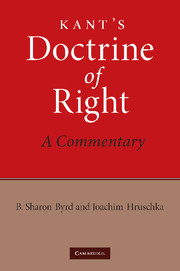Book contents
- Frontmatter
- Contents
- Introduction and methods of interpretation
- Chapter 1 The idea of the juridical state and the postulate of public law
- Chapter 2 The state of nature and the three leges
- Appendix to Chapter 2 Iustitia tutatrix, iustitia commutativa, and iustitia distributiva and their differences
- Chapter 3 The right to freedom
- Chapter 4 The permissive law in the Doctrine of Right
- Chapter 5 The external mine and thine
- Chapter 6 Intelligible possession of land
- Chapter 7 The “state in the idea”
- Chapter 8 The state in reality
- Chapter 9 International and cosmopolitan law
- Chapter 10 The “idea of public law” and its limits
- Chapter 11 Contract law I. Why must I keep my promise?
- Chapter 12 Contract law II. Kant's table of contracts
- Chapter 13 Criminal punishment
- Chapter 14 The human being as a person
- Appendix I to Chapter 14 On the logic of “‘ought’ implies ‘can’”
- Appendix II to Chapter 14 The system of rules of imputation
- Bibliography
- Index
Chapter 11 - Contract law I. Why must I keep my promise?
Published online by Cambridge University Press: 05 June 2012
- Frontmatter
- Contents
- Introduction and methods of interpretation
- Chapter 1 The idea of the juridical state and the postulate of public law
- Chapter 2 The state of nature and the three leges
- Appendix to Chapter 2 Iustitia tutatrix, iustitia commutativa, and iustitia distributiva and their differences
- Chapter 3 The right to freedom
- Chapter 4 The permissive law in the Doctrine of Right
- Chapter 5 The external mine and thine
- Chapter 6 Intelligible possession of land
- Chapter 7 The “state in the idea”
- Chapter 8 The state in reality
- Chapter 9 International and cosmopolitan law
- Chapter 10 The “idea of public law” and its limits
- Chapter 11 Contract law I. Why must I keep my promise?
- Chapter 12 Contract law II. Kant's table of contracts
- Chapter 13 Criminal punishment
- Chapter 14 The human being as a person
- Appendix I to Chapter 14 On the logic of “‘ought’ implies ‘can’”
- Appendix II to Chapter 14 The system of rules of imputation
- Bibliography
- Index
Summary
Kant begins his discussion of private law with what one can call the “general part” of private law on external objects of our choice. External objects of our choice include (1) physical things, (2) someone else's choice to perform an act, and (3) someone else, such as a spouse or child, in their relation to me. An external object of choice is thus not only an external thing one can own, but also someone else's choice to perform an act under a contractual agreement.
In this chapter we explain how Kant's ideas of intelligible possession apply to contractual claims. Section 1 begins with the permissive law of practical reason and its power-conferring norm. The permissive law gives everyone the moral capacity to be the claimant under a contract, and thus makes contractual claims possible. Section 2 then considers the exact nature of a contractual claim for Kant. We argue that Kant sees a contractual claim as a right we have against our contracting party and in addition as a universal right, meaning a right against everyone else. Kant's theory of contract thus treats contractual claims similar to property rights. Section 3 discusses the reality of contractual claims. In order to acquire a contractual claim in reality, one person must close a contract with another. By closing a contract, one acquires another person's choice to perform an act through the parties' united self-legislating wills. Section 4 discusses the necessity of such a claim.
- Type
- Chapter
- Information
- Kant's Doctrine of RightA Commentary, pp. 232 - 244Publisher: Cambridge University PressPrint publication year: 2010



